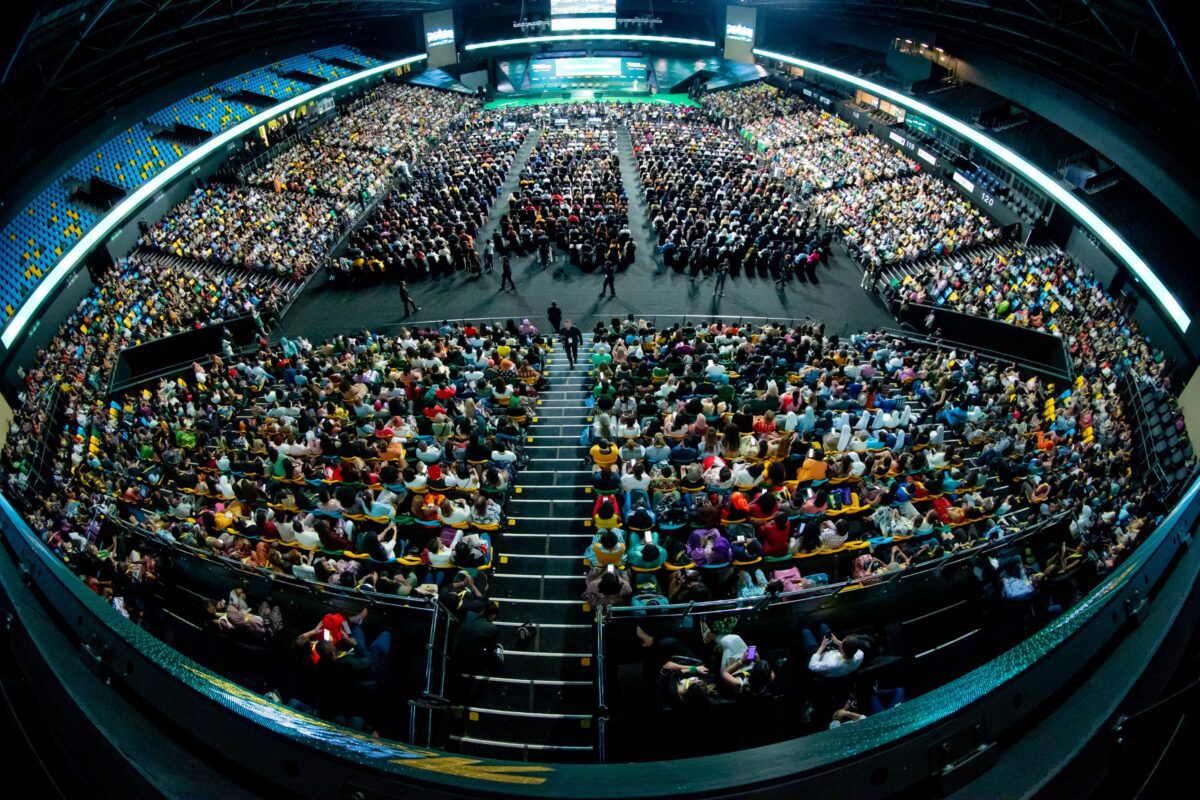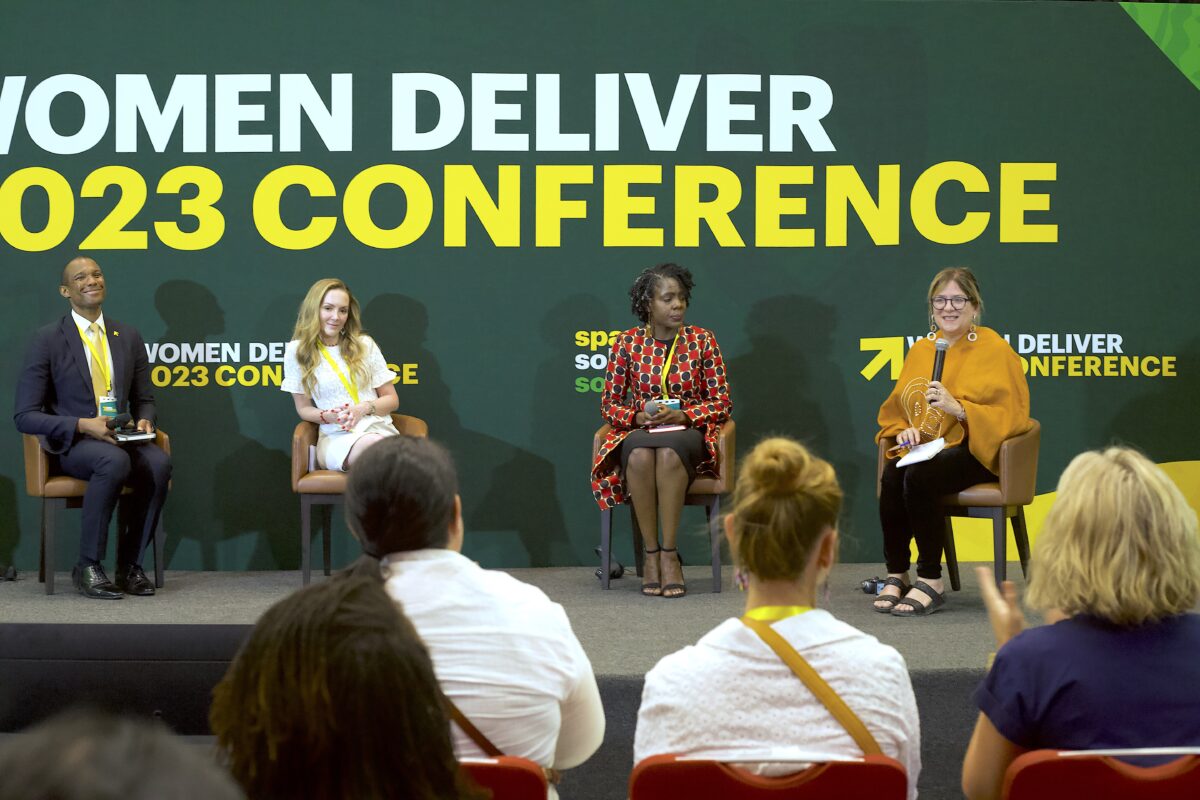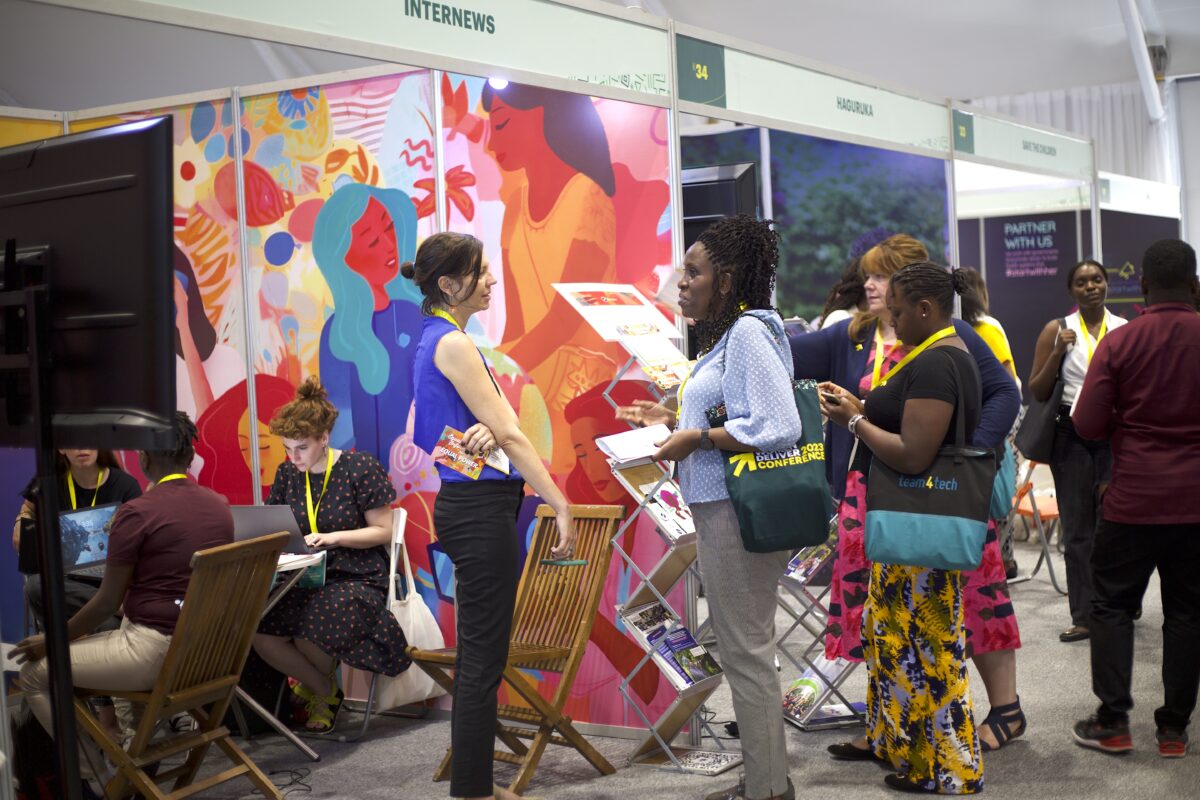by Christophe Hitayezu, Journalist and Internews Media Mentor

The sixth Women Deliver (WD2023) global conference was hosted by the Government of Rwanda in Kigali from July 16 to 20, 2023. Held for the very first time on the African continent, this is possibly the largest global gathering of feminists and their allies, according to Phumzile Mlambo-Ngcuka, Chair of the Women Deliver Board of Directors. With a significant presence at the conference, the Internews delegation witnessed global efforts and commitments towards advancing gender equality and protection of sexual and reproductive health and rights for women and girls.
Delivering the keynote address in Kigali, Rwanda’s President Paul Kagame urged global action to create a more equitable world, ensuring equal opportunities for women and men. He said that while countries have made progress in closing the gender divide, women and girls across the world continue to face major obstacles that impact their lives.
We must challenge ourselves to do things differently, and with a sense of urgency. Commitments which are not followed by action, cannot fulfill our promise to build a more just, equitable, and prosperous future for the generations that follow us.
Rwandan President Paul Kagame
Speaking at the opening ceremony, the UN Women Executive Director, Sima Bahous pointed out that there is a pushback against equality and women’s rights, a regression in sexual and reproductive health rights, increased gender-based violence, discrimination, and deeply rooted misogyny, all of which must be addressed with urgency and renewed commitment.
“It is not acceptable that we have 131 years predicted before we reach gender equality. Unacceptable!” said Mlambo-Ngcuka. “All of us who are here today must commit. We must choose the actions that we will take once we go home. We cannot go back and simply submit a report. We must take life-defining action for gender equality.”
“Over the last five days, we have had meaningful discourse on what must be done for women and girls globally. We must now act to secure their bodily autonomy and sexual and reproductive health and rights,” said Dr. Maliha Khan, President and CEO of Women Deliver.
In line with the conference theme – Spaces, Solidarity, Solutions – during a session entitled, “Taking a woman–powered approach to healthcare innovation,” Andrea Novella, Global Digital Health Advisor, Social Business Unit at Population Services International (PSI), underscored the need for safe spaces for women and girls to be able to access all their needs in one place, whether it means accessing information, products, or services.
Creating an inclusive space and targeted opportunities
“The heart of what we’re doing is creating that space. To build that , we need solidarity and partnerships because it’s a big space that we must create,” Novella said at the session moderated by Ida Jooste, Internews’ Global Media Advisor. “We are building this big table where we want everyone to sit down. And to do that, we realize we cannot build it alone. That’s where partnerships and solidarity come in.”

Apart from speeches and discussions, the conference also resulted in various commitments. Among them are a new funding facility, a campaign aimed at closing the gender nutrition gap, an online platform to address violence against women and girls, and a Call to Action.
The new funding facility with the Open Society Foundation aims to counter the anti-rights movement and provide financial investment into the most neglected sexual and reproductive health areas. “There’s no denying it: the fundamental freedoms of women in all their diversity and the LGBTQIA+ communities are under assault,” said Sumaiya Islam, Action Division Director of Intersectional Justice at Open Society Foundation. “Our best chance to fight back is to resource our feminist movements and to grow our collective political influence all the way from the local level to multilateral spaces, to ensure all voices are heard and fundamental rights are respected.”
“When women and girls are supported with funding and the right resources, they have the potential to challenge harmful norms, push for institutional and legislative reforms, and transform their communities,” said Dr. Khan.
A new campaign has also been launched by over 40 organizations to close the gender nutrition gap, alongside an Action Agenda that calls for transformative actions from governments to improve women’s and girls’ nutrition.
Moreover, Respect Women website, an online platform that aims to drive concrete actions to prevent and respond to violence against women and girls was also launched by The World Health Organization (WHO), together with UN Women, the United Nations Population Fund (UNFPA), and the United Nations Development Programme.
Furthermore, the United for Women and Girls’ Bodily Autonomy, a Kigali Call to Action was announced by the UNFPA to accelerate investments and actions, with women-led organizations and the feminist movement at the center. “Bodily autonomy is non-negotiable,” said Natalia Kanem, UNFPA Executive Director. “It is about choices, rights and the power of women and girls to decide over their own body. UNFPA is calling for coordinated and collective action to achieve bodily autonomy, reproductive rights, and gender equality by 2030.”
Women Deliver also launched a Women Deliver Emerging Leaders Program that seeks to put more funding into the hands of young people and ensure that they have the knowledge, resources, support, and leadership opportunities to achieve gender equality and sexual and reproductive health advocacy goals.
The Role of Journalists
WD2023 saw more than 100 journalists and content creators covering plenaries, side events and conducting interviews with more than 6300 feminists, 600 scholars, and 87 sponsors from 170 countries.
In an interview with Elias Hakizimana, a Rwandan journalist and a member of the Internews Health Journalism Network, Jooste emphasized the enormous responsibility that journalists carry. “I understand what we all go through. It’s a very exciting, but a very tiring and demanding job. I appreciate the work of journalists very much. All of us have one thing in common: to be accurate and to be there on behalf of viewers and listeners, and this is a big responsibility,” she said. “Your hard work is worthwhile, because you touch every single person in society.”
Speaking on behalf of the United Nations Secretary General, the UN Women Executive Director, Sima Bahous, acknowledged in the opening speech the importance of working towards tangible progress with various partners, including media professionals, governments, civil society, grassroots movements, the private sector, and youth organizations.
Internews’ Perspective

Megan Miller, Health Director at Internews, expressed excitement about the conference. “Six thousand people from around the world that share a common vision around gender equality is impressive! I was struck by the fact that this is the first Women Deliver conference on the continent of Africa, in a country that has achieved so much around gender equality. It was important, and I felt honored to be part of this event. I was also thrilled that Internews was able to have such a strong and diverse presence here.”
“I believe Internews has an important role to play in the gender equality space,” emphasized Miller. “I think media is an underrepresented piece of the development pie in terms of gender equality. In many meetings, people seem excited about our work. As an organization we have a lot to bring to this space. It is not just Internews’ work in health, in digital security, or in gender equality, it’s Internews. It was gratifying to see us having a unified approach as an organization and positioning ourselves as a strategic ally in this space.”